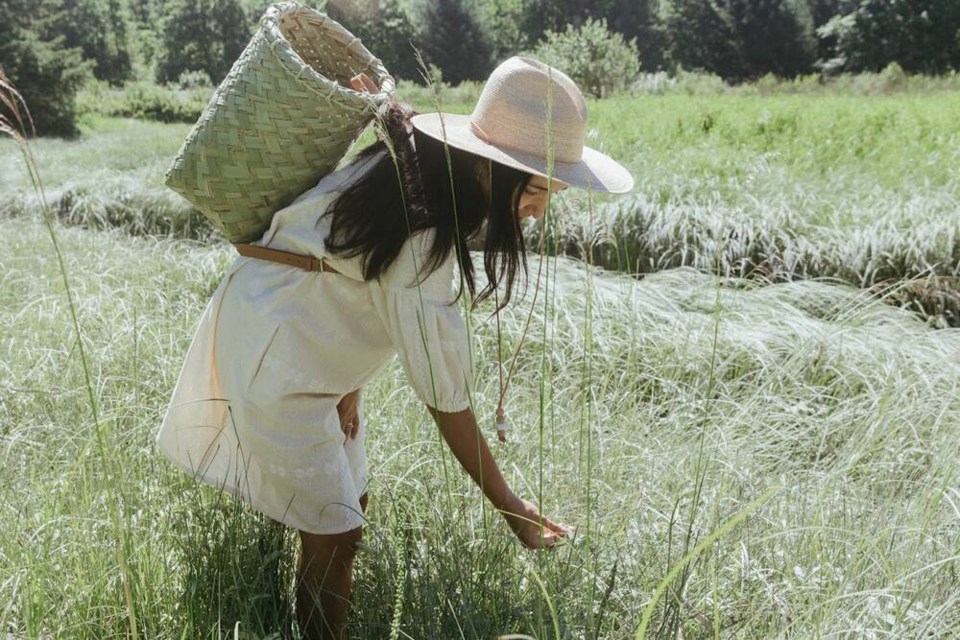When headaches plague Leigh Joseph, she doesn’t immediately reach for the Tylenol bottle. When winter’s flu strikes, cough medicines and throat soothers are acquired, but not from the pharmacy or the drug store aisle of her local supermarket.
Instead, Joseph, a Sḵwx̱wú7mesh Úxwumixw (Squamish Nation) ethnobotanist, looks to the great outdoors for remedy.
The natural world, she attests, can be a great source of healing and nourishment.
Stinging nettles, sage, sweetgrass or cedar, she says nature’s bounty can provide a treatment for ailments large and small, and the practice of growing and harvesting from trees, plants and flowering herbs is an infallible route to reconnecting with the land.
Her book Held By The Land: A Guide to Indigenous Plants for Wellness, is a handbook for those who want to reap the benefits of the natural world, or are looking for a deeper relationship with the outdoors, but aren’t sure where to start. It discusses how to harvest and use plants topically to treat common ailments, add nutrition to diets, and beautify one’s appearance.
The book is extensive, compiling 44 various plants, and intimate, with sections that honour and share the stories and traditions of the North American Indigenous communities who have long used native plants for medicine and food.
“The book addresses a gap that I found, through my own reading and my own research, in books that look at the cultural context for plant relationships,” she says, adding how it also discusses the ability we all have to "build respectful and reciprocal relationships" with our natural surroundings.
Joseph’s theoretical training – she has a Masters of Science in Ethnobotany from the University of Victoria and is currently working towards her PhD –guarantees she has an academic grasp of the environment, but it is her cultural knowledge harnessed, she says, that makes her book unparalleled.
Her culturally guided path with the Squamish Nation community has given her an insight into the region’s vegetation that so few others have, with much of her knowledge on certain flowers, herbs and plants obtained through conversation with relatives and Elders.
She talks of the humble stinging nettle, an omnipresent nuisance and a weed to most, and how she was raised to respect and admire its properties through her Squamish uncle.
“He uses it to help with inflammation, and a teaching that came along with this plant was to always use it topically and internally. So it can be used as a tea, or it can be dried and fused into an oil, or it can be added to meals as a nutritious spring food. He taught me that it has a multitude of uses,” she says.
The petals of a blossoming wild rose, often used as an antioxidant in recipes, an anti-inflammatory in medicine and a de-ager or skin soother in beauty treatments, feature heavily in treasured memories Joseph shares with loved ones.
“I just have such wonderful memories of being out with my kids or other family members and smelling the wild roses, and tasting their petals,” she says. “It just really defines the connection to really good family land-based memories for me.”
Joseph hopes stories like these will encourage others from the Squamish Nation, and other Indigenous communities, to connect deeper with the land. Because above all, she says, this book is for them – those who haven't always had the the freedom to explore their own lands or utilize ancestral knowledge.
“In the course of my studies, and also just my life, I’ve spent a lot of time thinking about my family members, and my ancestors, who have had the opportunity to be in connection to the land taken away from them,” she says.
“A lot of my research work has been looking at creating opportunities, in my community and other indigenous communities, to build confidence and a feeling of belonging out on the land. With this book I hope to create that opportunity.”
Joseph will discuss her book during a talk with journalist Eden Fine Day as part of her inclusion in the 2023 North Shore Writers Festival at the West Vancouver War Memorial Library, April 29.
Mina Kerr-Lazenby is the North Shore News’ Indigenous and civic affairs reporter. This reporting beat is made possible by the Local Journalism Initiative.



